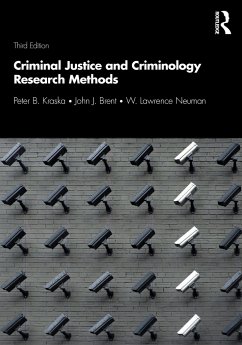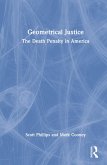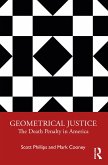- Broschiertes Buch
- Merkliste
- Auf die Merkliste
- Bewerten Bewerten
- Teilen
- Produkt teilen
- Produkterinnerung
- Produkterinnerung
Criminal Justice and Criminology Research Methods, 3rd Edition, is an accessible and engaging text that offers balanced coverage of a full range of contemporary research methods.
Andere Kunden interessierten sich auch für
![The Illustrated Guide to Social Science Research The Illustrated Guide to Social Science Research]() Divya SharmaThe Illustrated Guide to Social Science Research76,99 €
Divya SharmaThe Illustrated Guide to Social Science Research76,99 €![Geometrical Justice Geometrical Justice]() Scott PhillipsGeometrical Justice123,99 €
Scott PhillipsGeometrical Justice123,99 €![Geometrical Justice Geometrical Justice]() Scott PhillipsGeometrical Justice34,99 €
Scott PhillipsGeometrical Justice34,99 €![Essentials of Business Research Methods Essentials of Business Research Methods]() Joe Hair Jr. (USA Kennesaw State University)Essentials of Business Research Methods113,99 €
Joe Hair Jr. (USA Kennesaw State University)Essentials of Business Research Methods113,99 €![Law and the Politics of Memory Law and the Politics of Memory]() Stiina Loytomaki (Finland University of Jyv¿skyl¿)Law and the Politics of Memory191,99 €
Stiina Loytomaki (Finland University of Jyv¿skyl¿)Law and the Politics of Memory191,99 €![Researching Social Media with Children Researching Social Media with Children]() Antonio Silva Esquinas (Universidad Europea de Madrid)Researching Social Media with Children31,99 €
Antonio Silva Esquinas (Universidad Europea de Madrid)Researching Social Media with Children31,99 €![A History of Victims of Crime A History of Victims of Crime]() Stephen Strauss-WalshA History of Victims of Crime199,99 €
Stephen Strauss-WalshA History of Victims of Crime199,99 €-
-
-
Criminal Justice and Criminology Research Methods, 3rd Edition, is an accessible and engaging text that offers balanced coverage of a full range of contemporary research methods.
Hinweis: Dieser Artikel kann nur an eine deutsche Lieferadresse ausgeliefert werden.
Hinweis: Dieser Artikel kann nur an eine deutsche Lieferadresse ausgeliefert werden.
Produktdetails
- Produktdetails
- Verlag: Taylor & Francis Ltd
- 3 ed
- Seitenzahl: 546
- Erscheinungstermin: 31. Dezember 2020
- Englisch
- Abmessung: 254mm x 178mm x 28mm
- Gewicht: 1134g
- ISBN-13: 9780367133948
- ISBN-10: 0367133946
- Artikelnr.: 59983664
- Herstellerkennzeichnung
- Libri GmbH
- Europaallee 1
- 36244 Bad Hersfeld
- 06621 890
- Verlag: Taylor & Francis Ltd
- 3 ed
- Seitenzahl: 546
- Erscheinungstermin: 31. Dezember 2020
- Englisch
- Abmessung: 254mm x 178mm x 28mm
- Gewicht: 1134g
- ISBN-13: 9780367133948
- ISBN-10: 0367133946
- Artikelnr.: 59983664
- Herstellerkennzeichnung
- Libri GmbH
- Europaallee 1
- 36244 Bad Hersfeld
- 06621 890
Pete Kraska, Ph.D. is a professor in the School of Justice Studies. He has distinguished himself as a leading scholar in the areas of police and criminal justice militarization, criminal justice theory, and mixed-methods research. He has published seven books including Criminal Justice and Criminology Research Methods, Theorizing Criminal Justice: Eight Essential Orientations, and Militarizing The American Criminal Justice System: The Changing Roles of the Armed Forces and Police. Dr. Kraska's research has also been published in a number of leading journals, including the British Journal of Criminology, Social Problems, Justice Quarterly, and Policing and Society. Dr. Kraska's work has received national and international recognition. He is frequently asked to present his research and findings to academic and policy audiences, including most recently testifying for the US Senate on police militarization. His work has also been featured in media outlets such as 60 Minutes, The Economist, Washington Post, BBC, New York Times, Wall Street Journal, Huffington Post, National Public Radio, and PBS News Hour. John J. Brent, Ph.D. is an Assistant Professor in the School of Justice Studies at Eastern Kentucky University. He holds a Ph.D in Criminology from the University Delaware. His interests focus on: the cultural and structural dynamics of crime and crime-control; how institutions create and perpetuate inequalities; building a theoretical foundation for criminal justice theory; and how individuals are disciplined and punished. W. Lawrence Neuman, Ph.D. is a Professor Emeritus of Sociology at the University of Wisconsin, Whitewater. He has authored a number of methodological textbooks and published articles in leading academic journals covering a host of social, political, international, and cultural issues. His work has attracted funding from various grants, leading him to being awarded the Outstanding Researcher Award at his institution, and earning him the University of Wisconsin-System Teaching Fellow Award.
Part 1: Disciplinary, Theoretical, and Philosophical Foundations
1. Criminal Justice And Criminology Research: Mapping the Terrain
2. The Nature of Science and Research
3. Philosophical and Theoretical Foundations
Part 2: Considerations in Research Preparation
4. The Ethics of Crime and Justice Research
5. Research Design and Measurement
6. Sampling in Crime and Justice Research
Part Three: Quantitative Data Collection and Analysis
7. Experimental and Quasi-Experimental Crime and Justice Research
8. Survey and Interview Methods
9. Nonreactive Research: Content and Secondary Data Analysis
10. Analysis of Quantitative Data
Part Four: Qualitative and Mixed Methods Research
11. Qualitative Research and Analysis
12. Ethnographic Field Research and Qualitative Interview
13. Content Analysis, Historical Research, and Mixed Methods
14. Writing and Presenting Research
1. Criminal Justice And Criminology Research: Mapping the Terrain
2. The Nature of Science and Research
3. Philosophical and Theoretical Foundations
Part 2: Considerations in Research Preparation
4. The Ethics of Crime and Justice Research
5. Research Design and Measurement
6. Sampling in Crime and Justice Research
Part Three: Quantitative Data Collection and Analysis
7. Experimental and Quasi-Experimental Crime and Justice Research
8. Survey and Interview Methods
9. Nonreactive Research: Content and Secondary Data Analysis
10. Analysis of Quantitative Data
Part Four: Qualitative and Mixed Methods Research
11. Qualitative Research and Analysis
12. Ethnographic Field Research and Qualitative Interview
13. Content Analysis, Historical Research, and Mixed Methods
14. Writing and Presenting Research
Part 1: Disciplinary, Theoretical, and Philosophical Foundations
1. Criminal Justice And Criminology Research: Mapping the Terrain
2. The Nature of Science and Research
3. Philosophical and Theoretical Foundations
Part 2: Considerations in Research Preparation
4. The Ethics of Crime and Justice Research
5. Research Design and Measurement
6. Sampling in Crime and Justice Research
Part Three: Quantitative Data Collection and Analysis
7. Experimental and Quasi-Experimental Crime and Justice Research
8. Survey and Interview Methods
9. Nonreactive Research: Content and Secondary Data Analysis
10. Analysis of Quantitative Data
Part Four: Qualitative and Mixed Methods Research
11. Qualitative Research and Analysis
12. Ethnographic Field Research and Qualitative Interview
13. Content Analysis, Historical Research, and Mixed Methods
14. Writing and Presenting Research
1. Criminal Justice And Criminology Research: Mapping the Terrain
2. The Nature of Science and Research
3. Philosophical and Theoretical Foundations
Part 2: Considerations in Research Preparation
4. The Ethics of Crime and Justice Research
5. Research Design and Measurement
6. Sampling in Crime and Justice Research
Part Three: Quantitative Data Collection and Analysis
7. Experimental and Quasi-Experimental Crime and Justice Research
8. Survey and Interview Methods
9. Nonreactive Research: Content and Secondary Data Analysis
10. Analysis of Quantitative Data
Part Four: Qualitative and Mixed Methods Research
11. Qualitative Research and Analysis
12. Ethnographic Field Research and Qualitative Interview
13. Content Analysis, Historical Research, and Mixed Methods
14. Writing and Presenting Research








